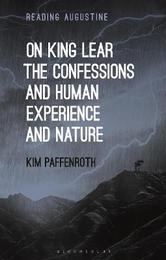
|
On King Lear, The Confessions, and Human Experience and Nature
Paperback / softback
Main Details
| Title |
On King Lear, The Confessions, and Human Experience and Nature
|
| Authors and Contributors |
By (author) Kim Paffenroth
|
| Series | Reading Augustine |
|---|
| Physical Properties |
| Format:Paperback / softback | | Pages:192 | | Dimensions(mm): Height 216,Width 138 |
|
| Category/Genre | Philosophy
Philosophy of religion |
|---|
| ISBN/Barcode |
9781350203198
|
| Classifications | Dewey:822.33 |
|---|
| Audience | | Professional & Vocational | |
|---|
|
Publishing Details |
| Publisher |
Bloomsbury Publishing PLC
|
| Imprint |
Bloomsbury Academic
|
| Publication Date |
17 June 2021 |
| Publication Country |
United Kingdom
|
Description
Augustine's Confessions and Shakespeare's King Lear are two of the most influential and enduring works of the Western canon or world literature. But what does Stratford-upon-Avon have to do with Hippo, or the ascetical heretic-fighting polemicist with the author of some of the world's most beautiful love poetry? To answer these questions, Kim Paffenroth analyses the similarities and differences between the thinking of these two figures on the themes of love, language, nature and reason. Pairing and connecting the insights of Shakespeare's most nihilist tragedy with those of Augustine's most personal and sometimes self-condemnatory, sometimes triumphal work, challenges us to see their worldviews as more similar than they first seem, and as more relevant to our own fragmented and disillusioned world.
Author Biography
Kim Paffenroth is Professor of Religious Studies and the Director of the Honors Program at Iona College, USA.
ReviewsWhat can the aged Lear and the young Augustine have to say to each other? Kim Paffenroth coaxes them to speak to us as only a great teacher can, with eloquence and insight. -- James J. O'Donnell, Classics Scholar, University Librarian, Arizona State University, USA Beautiful, moving, and deeply personal. Kim Paffenroth 'yokes' together these magnificent texts from Shakespeare and Augustine and delivers us remarkable new insights gleaned from 35 years of loving engagement. -- Mark Roosevelt, President, St. John's College, USA In search of 'timeless eternal truths,' Paffenroth brings into conversation a fifth century author and a sixteenth century author. Differing in historical context, experience, and perspective, St. Augustine and Shakespeare's Lear nevertheless share the condition of speaking from pressured and vulnerable seasons of life: Shakespeare's Lear is old, and Augustine's Confessions recall and relive his painfully disoriented youth. Paffenroth demonstrates that insights emerge when texts interact, challenging readers to reconsider the protagonists'-and possibly our own-assumptions about language, love, and loyalty. -- Margaret R. Miles, Emerita Professor of the History of Christianity, The Graduate Theological Union, Berkeley, California, USA
|